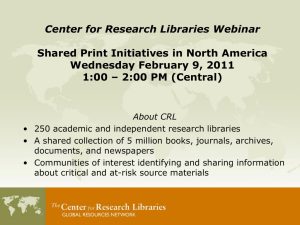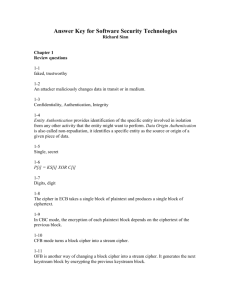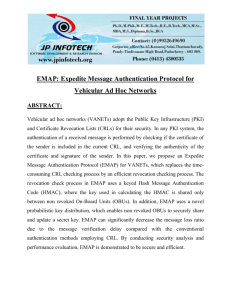10 Ways to Optimize Your CRL Membership
advertisement
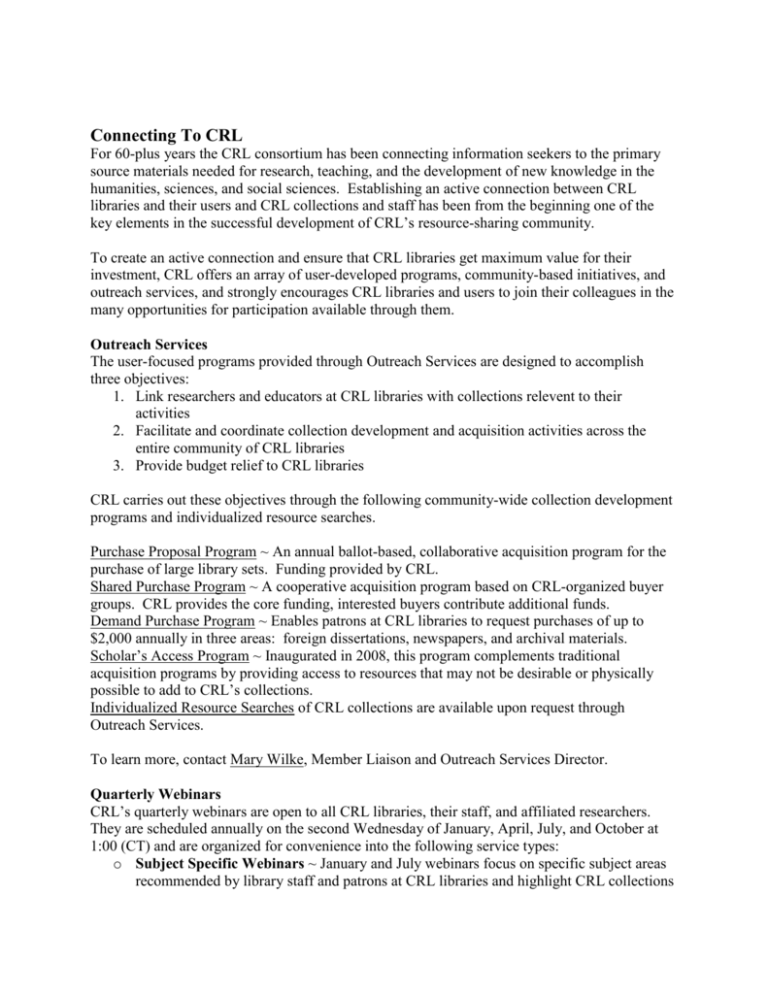
Connecting To CRL For 60-plus years the CRL consortium has been connecting information seekers to the primary source materials needed for research, teaching, and the development of new knowledge in the humanities, sciences, and social sciences. Establishing an active connection between CRL libraries and their users and CRL collections and staff has been from the beginning one of the key elements in the successful development of CRL’s resource-sharing community. To create an active connection and ensure that CRL libraries get maximum value for their investment, CRL offers an array of user-developed programs, community-based initiatives, and outreach services, and strongly encourages CRL libraries and users to join their colleagues in the many opportunities for participation available through them. Outreach Services The user-focused programs provided through Outreach Services are designed to accomplish three objectives: 1. Link researchers and educators at CRL libraries with collections relevent to their activities 2. Facilitate and coordinate collection development and acquisition activities across the entire community of CRL libraries 3. Provide budget relief to CRL libraries CRL carries out these objectives through the following community-wide collection development programs and individualized resource searches. Purchase Proposal Program ~ An annual ballot-based, collaborative acquisition program for the purchase of large library sets. Funding provided by CRL. Shared Purchase Program ~ A cooperative acquisition program based on CRL-organized buyer groups. CRL provides the core funding, interested buyers contribute additional funds. Demand Purchase Program ~ Enables patrons at CRL libraries to request purchases of up to $2,000 annually in three areas: foreign dissertations, newspapers, and archival materials. Scholar’s Access Program ~ Inaugurated in 2008, this program complements traditional acquisition programs by providing access to resources that may not be desirable or physically possible to add to CRL’s collections. Individualized Resource Searches of CRL collections are available upon request through Outreach Services. To learn more, contact Mary Wilke, Member Liaison and Outreach Services Director. Quarterly Webinars CRL’s quarterly webinars are open to all CRL libraries, their staff, and affiliated researchers. They are scheduled annually on the second Wednesday of January, April, July, and October at 1:00 (CT) and are organized for convenience into the following service types: o Subject Specific Webinars ~ January and July webinars focus on specific subject areas recommended by library staff and patrons at CRL libraries and highlight CRL collections and resources that support research and teaching in those areas. For example, the January 2010 webinar and FOCUS on Global Resources newsletter will profile CRL resources that support Southeast Asia studies. The summer 2009 webinar focused on China resources and the summer newsletter profiled CRL’s Resources on Modern China. o Collections and Access Webinars ~ The annual April and October webinars provide an overview of CRL collections and access, programs and services, policies and practices, and are ideal opportunities for: o Familiarizing newly hired library staff and faculty about CRL resources and the benefits of membership o Refresher course to update staff about new collections, programs, digitization activities, and more o Orienting staff and faculty at newly enrolled CRL libraries on CRL collections, programs, and how to get maximum value from their investment in CRL Contact Don Dyer, CRL’s Membership & Communiciations Coordinator, for guidelines. Building Awareness of CRL on Campus Developing an appropriate level of usage of CRL resources on campus is an important and sometimes challenging part of optimizing the value of a CRL membership. CRL has collaborated with many CRL libraries to develop and successfully implement promotional plans that connect with prospective users. The most successful efforts include some or all of the following components: o Add information about CRL to your library’s homepage or to another prominent location on the website o Highlight specific CRL resources in specific sections of your website. For example, provide a link from the History Department webpage to CRL’s topic guide for history. o CRL’s collection brochures and flyers are available to help spread the word on campus about CRL resources and services o Encourage library staff and faculty to participate in CRL’s quarterly webinars o Encourage library staff and faculty to subscribe to the CRL-Online listserv to receive issues of the Focus on Global Resources quarterly newsletter o Promote CRL resources via campus media o Disseminate CRL promotional materials through new faculty and new student orientations, targeted mailbox distribution, and other traditional methods o Provide off-campus access to CRL online materials that are IP-restricted to members only. To request brochures and flyers or discuss promotional strategies, please contact Don Dyer, Membership and Communications Coordinator (773-955-4545, ext. 317 or ddyer@crl.edu). Member Information Form To facilitate pro-active communication we ask that new members complete and submit a Member Information Form at their earliest convenience. The form asks for basic contact information for key library staff, as well as information on IP addresses and branch libraries. Providing this information promotes good communication and enables CRL staff to be proactive. CRL Key Service Staff Web Consultation Web specialists at member institutions are encouraged to dialogue with CRL web librarians on the effective use of links, media, proxy servers, loading CRL records, and other technological resources to optimize and facilitate user access to CRL resources. To arrange a web consultation, contact Russ Bomhof, Web and Digital Library Specialist, at 773-955-4545, ext. 335 or rbomhof@crl.edu. Cost-Saving Programs and Opportunities CRL libraries can help defray acquisition budget cutbacks by participating in CRL cost saving programs and opportunities. o Purchase Proposal Program ~ An annual ballot-based, collaborative acquisition program for the purchase of large library sets. Funding provided by CRL. o Shared Purchase Program ~ A cooperative acquisition program based on CRL-organized buyer groups. CRL provides the core funding, interested buyers contribute additional funds. o Demand Purchase Program ~ Enables patrons at CRL libraries to request purchase of up to $2,000 annually in three areas: foreign dissertations, newspapers, and archival materials. o Scholar’s Access Program ~ A program designed to complement traditional acquisition programs by providing access to resources that may not be desirable or physically possible to add to CRL’s collections. o Many CRL libraries rely on CRL’s extensive legacy newspaper collections rather than maintaining the subscriptions themselves, saving thousands annually. o Many libraries create needed shelf space by participating in JSTOR and distributed archiving initiatives. Governance Founded in 1949, CRL is an independent not-for-profit 501(c)(3) organization. It is governed by its member organizations in accordance with its bylaws. Representatives of the member organizations comprise the CRL Council of Voting Members, which meets annually to elect the Board of Directors, review and approve the budget, and vote on proposed changes to the bylaws. Voting member representatives also nominate and decide on the Center's major acquisitions on an annual basis. CRL libraries are invited to nominate candidates for the CRL board of directors, taskforce committees , and other governance opportunities.
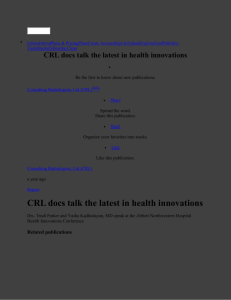
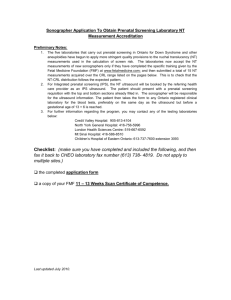
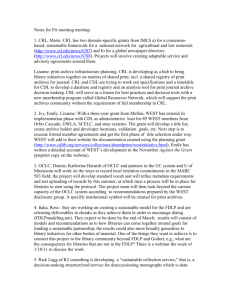
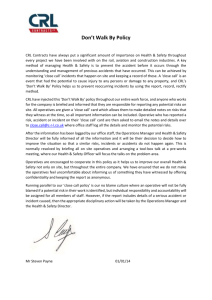
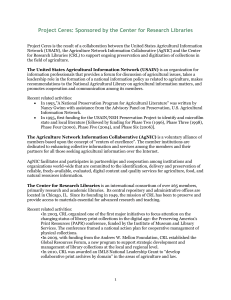
![Project Ceres Information Sheet (Round II 2014) [Microsoft Word]](http://s3.studylib.net/store/data/006986381_1-5db179c9b5e786dc75fad303304b65c3-300x300.png)
